%20of%20westentoldfaithbulbar.JPG)
WEST ENTRANCE
TO MADISON JUNCTION (approx.14 miles):
The West Entrance to Yellowstone National
Park begins out of the southeast corner of the accomodating town of
West Yellowstone, Montana. The west entrance was established in 1905,
5 miles east of the present day west gate. If you like to flyfish, there is a road approximately 1/5 mile from the
entrance, that leads to the Madison River and the Barnes Pools made
famous by Charlie Brooks.
As you continue on the main road, it
closely follows the 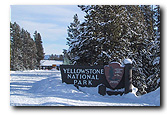
Madison River and allows you to view the Madison Plateau to the south
and the rim of the Yellowstone Caldera to the north. Geological landmarks
include Mount Haynes, named after F. Jay Haynes the noted Park photographer,
Mount Jackson named after William Henry Jackson, the official photographer
of the Hayden Expedition, and National Park Mountain receiving its name
because it overlooks the site where the idea on Yellowstone National
Park was conceived.
In & near the Madison River you may see
waterfowl, including: Ducks (Golden Eye, Merganser, Mallard, Coots,
and others,) Geese (Greater & Lessor Canada, Snow, and others,) & Trumpeter
Swans, being the most common. Maternity herds and bachelor groups of
Bison feed all winter in the meadows adjacent to the river, as do both
cow and bull Elk. Wolves and Coyotes frequent this area too, along with
animal tracks, elk and bison beds. Restrooms are located at Seven Mile
Bridge and at the Warming Hut at Madison Junction. The warming hut is
an excellent stop for winter visitors especially if you intend to do
the Grand Loop tour.
MADISON
JUNCTION TO OLD FAITHFUL (approx. 16 miles):
The road gently climbs out of the Madison
River Valley to the three
most visited geyser basins in the park (Lower, Midway, Upper.) The road
follows the Firehole River, past Firehole Falls in the Firehole Canyon
, through a gently broken valley to Old Faithful. Restrooms are located
at Fountain Paint Pots, Bisquit Basin, and Old Faithful. Located less
than a mile from Madison Junction is Firehole Canyon Drive. This road
follows the stream bank of the Firehole River in its narrow canyon and
abruptly climbs to the top of Firehole Falls, one of many roadside waterfalls
in Yellowstone. Above the falls Firehole canyon widens rapidly into
the
Firehole valley and wildlife viewing opportunities abound. Ducks, Geese,
Dippers, Swans, Elk, Bison, Wolves, Coyotes, Woodpeckers, Eagles, Deer,
Hares, Porcupines, Ravens, Mice, Martens, and other animals may be seen
along this stretch of road all winter.
Lower
Geyser Basin
About half way to Old faithful
and one of the most popular 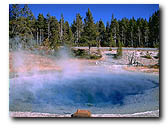
attractions in this basin are located at Fountain Paint Pots. With just
a short walk it is possible to see all four types of the parks thermal
features (Hot Springs, Fumaroles, Mud Pots, Geysers.) Silex Spring is
a classic hot spring with attendant features of color, temperature,
biota, and spectacle. Be sure to look closely at the bacterial and algae
mats for flies that subsist only on this food, and the spiders that
subsist only on the flies. These life forms are the food source for
mites, mice, insects, and birds. Fountain Paint Pot is usually best
viewed in winter when the water table, and local snow melt combine to
produce perfect conditions for the display of the world famous 'bubbling
mud.' Red Spouter is a recent feature that developed in 1959 after the
Hebgen Earthquake. In the summer it is just an ordinary fumarole, but
in the winter it spouts red water and red mud. Clepsydra Geyser is a
spectacular sight and the boardwalk allows visitors to get an up-close-and-personal
view of this feature. Lucky visitors will have the chance to see Fountain
Geyser, a spectacular display of several related geysers erupting in
a wild symphony of sights, sounds and spray. Don't let the silica-rich
waters get on your camera lenses!
Midway
Geyser Basin
About 2 miles south
of Fountain Paint Pot. Excelsior Geyser 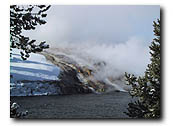
and Grand Prismatic Hot spring (the largest hot spring in the
park,) are the main attractions in this basin. Upper Geyser Basin is
a collection of three conjoined sub-basins surrounding the Old Faithful
area (Biscuit Basin, Black Sand Basin, Old Faithful Basin.) This part
of Yellowstone contains the largest concentration of geysers in the
world. The geysers have been combined by proximity, geologic, and topographic
criteria into groups. All the groups are accessible in the winter.
Biscuit Basin
Is formed by the confluence of the Firehole River and Iron Spring Creek.
It is a meadow that attracts large animals and waterfowl in the winter
because of the heat and available forage. It is common to see large
bull elk and giant bull bison grazing side by side in this lush meadow.
The visitor with a sharp eye will also be able to identify many shore
birds, waterfowl, and scavengers around the edges of the grazing herds.
Thermal attractions in this area include: Sapphire Pool, Jewel Geyser,
Mustard Spring, Avoca Spring, and Shell Geyser. 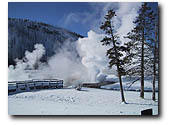
Black Sand Basin
Derives its name from the concentration of black obsidian (volcanic
glass,) sand in the basin. Two large hot springs (Emerald Pool & Rainbow
Pool,) are located here. Sunset Lake (a hot spring that behaves like
a geyser,) Cliff Geyser, Spouter Geyser, and Opalescent Pool are also
located here.
Upper Geyser Basin
The Upper Geyser Basin has the largest
concentration of geysers in the
world. Most of these geysers can
be viewed either during summer or winter. Check with the visitor center
for eruption times. Be sure to make time and visit the Old Faithful
Inn.
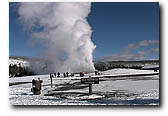
|
Click the Image
for
Old Faithful Video |
Old Faithful Basin contains five major
geyser groupings,
each is named for the signature geyser(s) in the group.
Visitors with time to enjoy thermal features should spend some time
with each group. Old Faithful is the most visited attraction in the
park. Even though it is not the largest or most regular, the frequency
of its eruptions make it the most reliable. The 1870 Washburn Expedition
made a wise choice on its namesake.
Geyser Hill Group: Old faithful, Anemone
Geyser, Plume Geyser, Beehive Geyser,
Lion Group, Giantess Geyser, Heart Spring,
Solitary Geyser, and Doublet Pool.
Castle-Grand
Group: Castle Geyser, Grand Geyser, Spasmodic Geyser, Sawmill Geyser,
and Crested Pool.
Giant-Grotto Group: Giant Geyser, Grotto
Geyser, Beauty Pool,
Chromatic Spring, Oblong Geyser.
Daisy Group: Daisy Geyser, Splendid Geyser,
Comet Geyser, Black Sand Spring, and Punchbowl Spring and is a popular
place for scenic photography. Riverside-Morning Glory Group: Riverside
Geyser, Morning Glory Pool, Gem Pool, Artemisia Geyser.
For in-depth information on any of
the geyser areas go to our Geyser Directory.
|

